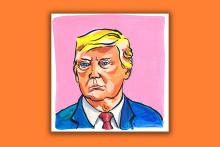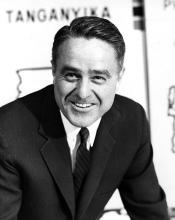Kennedy

IT'S UNLIKELY THAT Donald Trump is fretting over his presidential portrait. With further legal troubles and several industries turned against him, the man has bigger fish to fry. But as we’ve learned time and time again through the ravages of the coronavirus and police violence, just because Trump isn’t worried about something doesn’t mean it doesn’t matter. The unconfirmed, though expected, portrait offers a chance for him to shape a legacy that is in dire need of salvaging. Trump’s painting could serve to underscore—or attempt to elide—the unconventional nature of his time in office, potentially adding a glossy filter to a difficult period in American history. Of course, filtering is more than part and parcel of portraiture. It’s the very nature of the job.
Throughout the centuries, portraiture has been the province of the wealthy and, despite its biographical nature, is a genre that conceals nearly as much as it reveals. Louis XIV, another larger-than-life leader, exhibits this multiplicity of meaning all too well in his portraits. Painter Charles Poerson clothes Louis XIV in the garb of Jupiter—complete with lightning bolts in hand—to signify his victory over a series of nobility uprisings known as the Fronde. By shrouding the king’s humanity, Poerson makes Louis into someone divine, armed with greater might than mere mortals. Who needs the imago dei when you can simply be God? A different portrait replaces the gouty king’s legs with the calves of a younger man. In short, the sovereign portrait is synonymous with a kind of psychological trompe l’oeil, created to preserve power and project glory. American presidential portraits differ in their ends, though they are invested in other kinds of self-delusion: equality and equanimity.

"We are bombarded with one false choice after another. Coal miners or single moms, rural communities or inner cities. The coast or the heartland. ...[But] we choose both. We fight for both, because the greatest, strongest, richest nation in the world should not have to leave anyone behind."

In June my husband, who gets lots of review copies unbidden, asked me if I wanted to read Mark Shriver's memoir about his father, Sargent Shriver, who passed away in 2011 at age 95.
"Since you're a fan of all things Kennedy," he said, "I thought you might want to see it."
I didn't.
True, a high point in my adolescent life was standing in back of St. Matthew's Cathedral one December morning in 1963 waiting for mass to begin when suddenly a very tall, very disheveled, very pregnant Eunice Kennedy Shriver pushed past me, wearing smudged red lipstick and a full-length fur coat. But sons are not necessarily good biographers, and anyway, I had a stack of mysteries awaiting my attention.
But then in July, a Facebook friend pointed me to Reeve Lindbergh's review of A Good Man in the Washington Post, suggesting that this was a book I might want to read. Lindbergh — herself the daughter of two famous parents, Charles and Anne Morrow Lindbergh — called it "a moving and thoughtful book." Maybe I'll read this after all, I said to myself. And then a week or two later, my friend Estelle sent me a copy of the book as an early birthday present, telling me she thought I'd connect with it on many levels.
I must be supposed to read this one, I thought.
[Editor's Note: In anticipation of the anniversary of the March on Washington on August 28, 1963, God's Politics will feature a series of posts on the legacy of Dr. Martin Luther King.